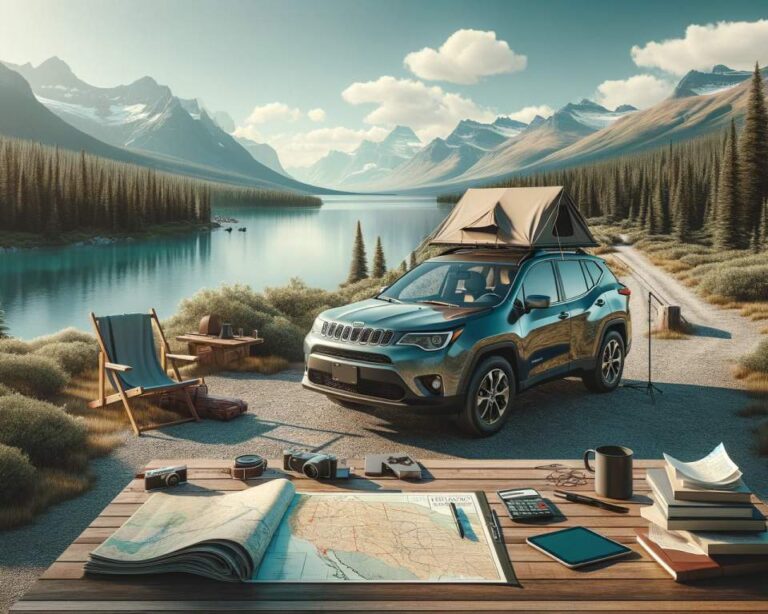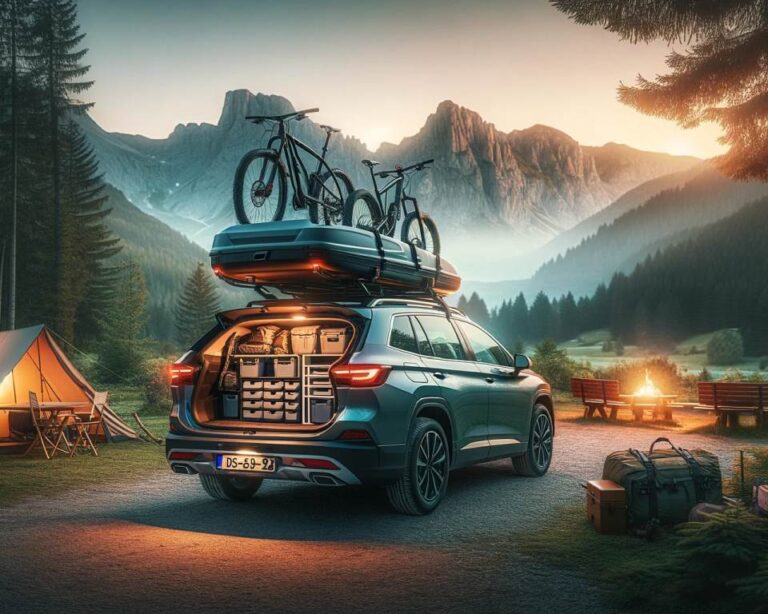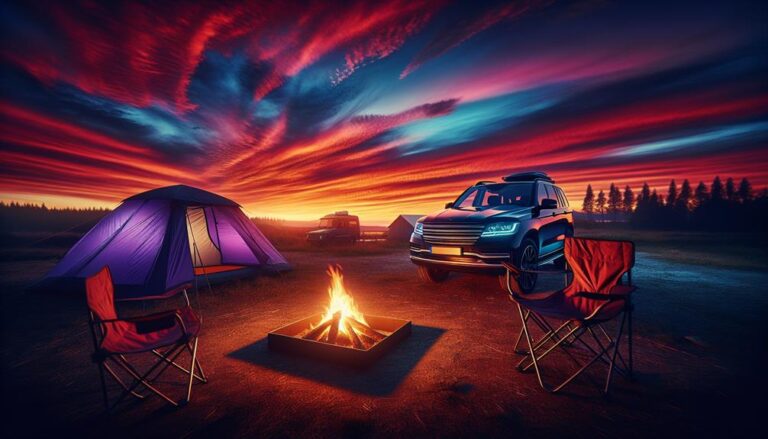What's Better for Sleep While Camping: A Tent or A Car?
For better sleep while camping, choose a car over a tent. The spaciousness and convenience of a vehicle surpass the confined setting of a tent. Cars offer better insulation, important for maintaining ideal sleep temperature. They provide improved noise reduction and privacy, enhancing rest quality. Safety is also amplified in a car, promoting a more secure feeling during your slumber. Skip the tent hassle and opt for the simplicity and comfort of car sleeping for a well-rested night outdoors. More details await on the optimum camping sleep choice.
Comfort and Space
When camping, the importance and impact of the comfort and space available in your sleeping arrangement can greatly affect your overall experience. Your sleeping arrangements play a vital role in guaranteeing a good night’s rest in the great outdoors. Whether you choose to sleep in a tent or your car, prioritizing sleeping comfort is key.
Regarding sleeping arrangements, tents offer a more traditional camping experience. They provide protection from the elements and a sense of being closer to nature. However, tents can be limiting when it comes to space, especially if you have large camping gear or need extra room to move around. On the other hand, sleeping in your car can offer more space and convenience. You have the option to recline your seats or even lay down a mattress for added comfort.
When it comes to sleeping comfort, consider factors such as the quality of your sleeping bag or bedding, the support of your sleeping surface, and the overall temperature inside your sleeping space. Prioritize your comfort to ensure a restful night’s sleep while camping.
Temperature Control
Maintaining ideal temperature control while camping is essential for a comfortable and restful night’s sleep. When deciding between a tent and a car, consider factors like insulation effectiveness and energy efficiency. Tents can vary in insulation quality; look for features like double-wall construction or insulated fabric to retain heat in cooler weather. Similarly, cars provide some level of insulation, but they can also trap heat in warmer climates. To enhance energy efficiency, use blankets or sleeping bags appropriate for the expected temperature range.
Ventilation options are vital for regulating temperature. Tents offer windows, doors, and vents that can be adjusted to control airflow circulation. Utilize these openings strategically to prevent condensation and maintain a comfortable atmosphere inside. In a car, crack windows slightly to allow fresh air in while keeping insects out. Be cautious of leaving windows too wide open for safety reasons.
Noise and Privacy
For a vital night’s sleep while camping, it is important to take into account the levels of noise and privacy provided by both a tent and a car. Tents, although they provide a more immersive experience in nature, offer limited soundproofing benefits compared to sleeping in a car. The thin walls of a tent allow outside noises like rustling leaves or animal sounds to penetrate easily, potentially disrupting your rest. Privacy concerns can also arise as tents offer little protection from prying eyes or unwanted wildlife.
On the other hand, sleeping in a car can offer better soundproofing benefits due to the enclosed space, dampening external noises for a quieter sleeping environment. Cars also provide more privacy, shielding you from curious onlookers and enhancing your sense of security. However, it’s essential to take into account the environmental impact of sleeping in a car, as it may not align with the ethos of immersing oneself in the natural surroundings while camping.
Safety and Security
To guarantee a restful night’s sleep while camping, prioritizing safety and security is essential. When camping, always have a plan in place for emergency situations. Keep a first aid kit handy and know the location of the nearest medical facilities. Secure your personal belongings by storing them safely in your tent or car to prevent theft or damage.
In terms of wildlife encounters, it’s vital to prioritize personal safety. Keep food sealed and stored away from your sleeping area to avoid attracting animals. Be aware of your surroundings and follow proper protocols for encountering wildlife. It’s advisable to research the specific wildlife in the area you are camping in and understand how to react if you encounter them.
Setup and Pack-up Effort
Setting up and packing up your camping gear efficiently can greatly impact your overall camping experience. When contemplating whether to sleep in a tent or car, the setup and pack-up effort is an important factor to take into account. Here are some key points to consider for optimizing your camping experience:
- Time Efficiency: Setting up a tent can take more time and effort compared to simply parking your car for sleep.
- Convenience: Sleeping in your car eliminates the need to pitch a tent, saving you time and hassle.
- Energy Saving: After a long day of hiking or exploring, the simplicity of sleeping in your car can help conserve your energy for the next day’s adventures.
- Simplicity: Sleeping in a car provides a straightforward and quick setup, allowing you to focus on enjoying the outdoors rather than dealing with tent assembly.
Mobility and Accessibility
Maximizing mobility and accessibility while camping involves strategically considering your sleeping arrangements with regards to ease of movement and convenience. When it comes to camping gear, vehicle camping offers a significant advantage. Storing your camping gear in your vehicle allows for quick access to essentials like sleeping bags, cooking equipment, and first aid kits without the need to unpack and repack each time you move campsites.
Furthermore, vehicle camping provides a level of security and organization for your belongings. Items can be neatly stored in your car, keeping them safe from the elements and wildlife. This not only saves time but also guarantees that important gear is readily available whenever needed.
In terms of accessibility, sleeping in a car can offer a more convenient option for individuals with mobility issues. Being able to sleep in a vehicle eliminates the need to navigate uneven terrain or set up a tent, making it a safer and more accessible choice for those with physical limitations.
Weather Resistance
When it comes to weather resistance in camping gear, durability is key. Your tent or car must withstand rain with ease, offering you dry shelter during unexpected downpours. Additionally, wind resistance is essential to prevent your shelter from collapsing in strong gusts.
Tent Vs Car: Durability
Selecting a sturdy tent with a high level of weather resistance is vital to ensure a comfortable camping experience in various conditions. When comparing the durability of tents and cars for camping, it’s important to take into account the longevity and material quality of the shelter you choose. Here are some key points to keep in mind:
- Tent Longevity: Quality tents made from durable materials like ripstop nylon or polyester can last for many seasons with proper care.
- Material Wear and Tear: Tents are susceptible to wear and tear from UV exposure, rain, and wind, requiring regular maintenance such as seam sealing and waterproofing treatments.
- Car Longevity: While cars offer solid protection, they can also face wear and tear over time due to exposure to the elements and rough terrain.
- Maintenance Needs: Regular maintenance of your car, including checking the tires, brakes, and fluids, is important for a safe and comfortable camping experience.
Rain Protection Comparison
Ensuring reliable rain protection is essential when comparing the weather resistance of camping in a tent versus a car. When it comes to waterproofing effectiveness, tents typically offer better protection against rain compared to cars. Tents are designed with specialized waterproof materials and rainflys to keep you dry during wet weather. However, cars can also provide adequate rain protection if you park strategically or have a rooftop tent.
Ventilation balance is vital to prevent condensation buildup inside your shelter. Tents usually have mesh panels and adjustable vents that allow for airflow, reducing the chances of moisture accumulation. In contrast, cars may lack proper ventilation, leading to condensation issues if not managed effectively.
Proper moisture management is key in both tent and car camping. In tents, using ground cloths and ensuring rainfly coverage are essential. In cars, cracking windows slightly can help with airflow. Overall, while tents offer superior rain protection and ventilation balance, with proper precautions, camping in a car can also be a comfortable and safe option during rainy conditions.
Wind Resistance Evaluation
For evaluating wind resistance in camping shelters, take into account the structural design and materials used to withstand strong gusts. When evaluating wind resistance for better sleep quality during camping, bear in mind the camping location and prevailing wind direction. Here are some key points to ponder:
- Tent Orientation: Position your tent so it faces the wind head-on to minimize resistance and potential damage.
- Guy Lines: Secure all guy lines properly and make sure they are taut to prevent flapping in the wind.
- Sturdy Poles: Opt for tents with robust poles that can withstand high winds without buckling.
- Weatherproof Materials: Choose a tent made of durable, weather-resistant materials like ripstop nylon or polyester to enhance wind resistance.
Cost and Budget
When comparing the cost of sleeping in a tent versus a car while camping, it’s crucial to take into account various factors to make a budget-friendly decision. Understanding the financial implications of each option will help you choose the most suitable and cost-effective sleep arrangement for your camping trip. Bear in mind not only the initial investment but also ongoing costs to guarantee your camping experience aligns with your budget goals.
Cost Comparison Analysis
Considering your budget when deciding between camping in a tent or staying in a car can greatly impact your overall camping experience. Here is a cost comparison analysis to help you make an informed decision:
- Tent Camping:
- Initial cost for purchasing a tent and camping gear.
- Additional costs for camping permits or campground fees.
- Potential expenses for repairs or replacements of gear.
- Might need to invest in sleeping pads or air mattresses for better sleep quality.
- Car Camping:
- No initial investment needed if you already own a suitable vehicle.
- Potential savings on camping gear as you can utilize your car for storage.
- Possibility of free camping locations like rest stops or dispersed camping areas.
- Can provide better security and protection from the elements compared to a tent.
When considering your budget, weigh the costs of tent camping with the convenience and potential savings of car camping. Choose the option that aligns best with your financial constraints and camping preferences.
Budget-Friendly Sleep Options
To save money while guaranteeing a comfortable sleep during camping, explore budget-friendly sleep options that align with your financial constraints and camping preferences. When it comes to sleeping pad options, consider foam pads or self-inflating pads as cost-effective choices that still provide decent cushioning and insulation from the ground. For sleeping bag alternatives, look into synthetic fill sleeping bags, which are more affordable than down-filled ones but can still offer warmth and comfort. If you prefer a bit more cushioning, air mattresses are a good option, and there are budget-friendly choices available that won’t break the bank. When it comes to blankets, fleece blankets are lightweight, affordable, and provide warmth during chilly nights. By strategically selecting these budget-friendly sleep essentials, you can ensure a restful night’s sleep without overspending on camping gear. Remember, a good night’s sleep is essential for enjoying your camping adventures safely and comfortably.
Financial Considerations for Camping
Examine your camping financial considerations by carefully evaluating the costs involved and setting a budget that aligns with your camping needs and preferences. When planning your camping trip, it’s essential to take into account your financial constraints and allocate your budget wisely to guarantee a safe and enjoyable experience. Here are some tips to help you navigate the financial aspects of camping:
- Budget Planning: Start by outlining all potential expenses, including camping gear, food, transportation, and campground fees. Creating a detailed budget will give you a clear overview of your financial requirements.
- Savings Tips: Look for discounts on camping equipment, consider borrowing or renting gear, and plan meals that are cost-effective but nutritious. Saving money on these aspects can free up funds for other camping essentials.
- Camping Expenses: Keep track of your spending during the trip to avoid overspending. Be mindful of unexpected costs that may arise, such as emergency supplies or repair fees.
- Financial Constraints: Prioritize your expenses based on your budget limitations. Make informed decisions to make sure that you stay within your financial means while still enjoying a memorable camping experience.
Choosing Between Sleeping in a Tent or a Car While Camping
Overall, when it comes to choosing between sleeping in a tent or a car while camping, it ultimately depends on your personal preferences and comfort level. Both options have their pros and cons, so it’s important to take into account factors such as space, temperature control, noise, safety, setup effort, mobility, weather resistance, and budget. Ultimately, go with the option that suits your needs and allows you to get a good night’s sleep in the great outdoors. Happy camping!







